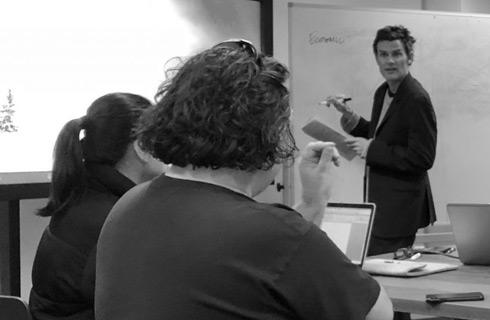哲学博士-犯罪学
Doctor of Philosophy - Criminology

学历文凭
Ph.D.

专业院系

开学时间

课程时长

课程学费

国际学生入学条件
IDP—雅思考试联合主办方

雅思考试总分
6.5
- 雅思总分:6.5
- 托福网考总分:90
- 托福笔试总分:160
- 其他语言考试:Pearson Test of English: minimum score of 58 (with a ‘Communicative’ score of not less than 50)
CRICOS代码:
申请截止日期: 请与IDP联系 以获取详细信息。
课程简介
A Doctor of Philosophy (PhD) degree involves original and sustained research, mentored by an academic supervisor. It’s an opportunity to make new discoveries, address some of the big issues of our time, challenge yourself, and develop a mix of transferable and specialised skills. Go deeper into the explanations for crime and the workings of the criminal justice system. Study the characteristics of offenders and how criminal behaviour relates to a wide range of social factors. You'll be intellectually challenged while digging deeply into social realities. Examine who goes to prison, the nature of punishment or the relationship between drugs and crime. Explore the experiences of victims within the justice system, or unpack public perceptions about crime. Consider responses to global problems such as trafficking or terrorism, genocide or ecocide. You'll develop the skills to carry out independent research into justice-related problems. You'll learn to evaluate a variety of situations with a critical, criminological mind. You'll improve your written and spoken communication as you present your findings in reports and in academic forums. At the School of Social and Cultural Studies, you'll learn from widely-published academics whose research is internationally recognised.
相关申请
 预科
预科 奖学金
奖学金 实习机会
实习机会 在校学习
在校学习 跨境学习
跨境学习 校园授课-线上开始
校园授课-线上开始 在线/远程学习
在线/远程学习
开学时间&学费
学费信息仅供参考,请与IDP联系以获取详细信息
| 开学时间 | 时长 | 学费 | 地点 |
|---|
学校排名

世界排名501
数据源:
泰晤士高等教育世界大学排名
关于维多利亚惠林顿大学

惠灵顿维多利亚大学,全称Te Herenga Waka,位于新西兰首都的中心地带,是一个政治、创意和创新中心。该大学的中心位置使学生能够接触到商业、政府、政治、文化和遗产、艺术和电影制作业以及科技界等领域的各种国家组织。惠灵顿是一个紧凑的城市,学生可以轻松探索观景小径、海滩、画廊、博物馆和活动。它是一个多元文化的城市,28%的人口出生在海外,安全、友好,以美味的食物和咖啡而闻名,经常被评为世界上最宜居的城市之一。优质的教育惠灵顿维多利亚大学在全球主要排名中一直名列前茅。根据QS Stars卓越评级,这是仅有的23所获得完整''5星+''评级的机构之一,该评级建立在从就业到全球参与、教学、设施、艺术等所有八个类别的5星评级之上。惠灵顿维多利亚大学在以下学科领域进行教学和研究:建筑与设计创新、商业与政府、教育、工程、健康、人文社会科学、法律和科学。该大学拥有40多个研究中心和研究所,包括南极研究中心和数据科学与人工智能中心。热情的社区惠灵顿大学和惠灵顿市拥有一个多元化的社区,欢迎来自120多个国家的国际学生,并通过一系列的福利和学习服务为学生提供全面的支持。这里有130多个俱乐部、社团和体育活动可供探索,而免费的Kitea Impact Program(领导力课程)等课外课程则支持学生培养个人的全球公民技能。
本校相关课程
其他相关课程

艺术与文化管理硕士
 墨尔本大学
墨尔本大学学历文凭
Masters Degree (Coursework)
开学日期
课程费用总额


商业硕士(研究)
 斯威本科技大学
斯威本科技大学泰晤士高等教育世界大学排名:282
学历文凭
Masters Degree (Research)
开学日期
课程费用总额


犯罪学学士学位
 新英格兰大学
新英格兰大学学历文凭
Bachelor Degree with Honours
开学日期
课程费用总额


Study Abroad - JNSBA
 维多利亚大学
维多利亚大学泰晤士高等教育世界大学排名:602
学历文凭
Study Abroad
开学日期
课程费用总额


文理科学士学位
 悉尼大学
悉尼大学泰晤士高等教育世界大学排名:54
学历文凭
Bachelor Degree
开学日期
课程费用总额


犯罪学硕士(专业)
 邦德大学
邦德大学泰晤士高等教育世界大学排名:412
学历文凭
Masters Degree (Coursework)
开学日期
课程费用总额










 新西兰
新西兰





